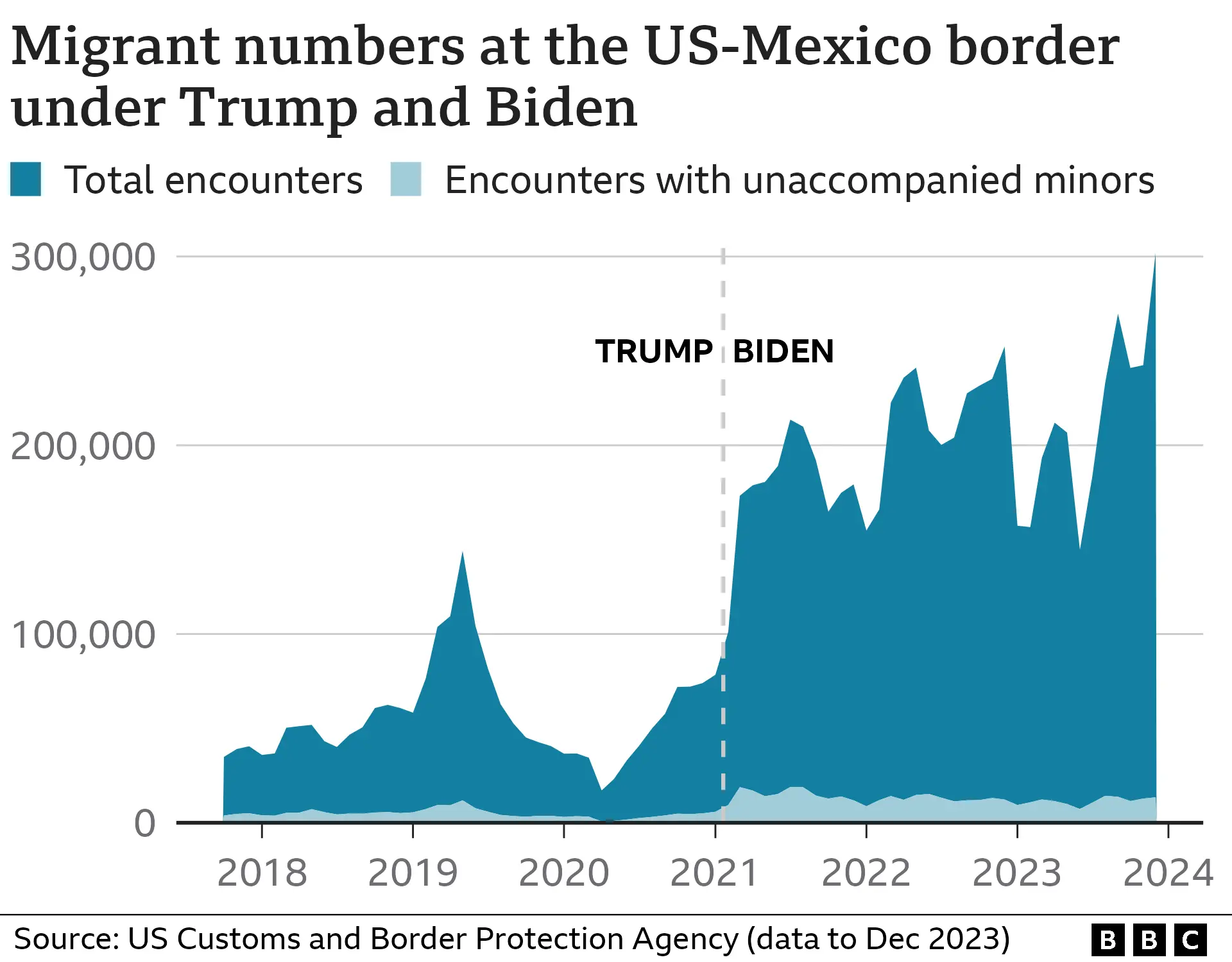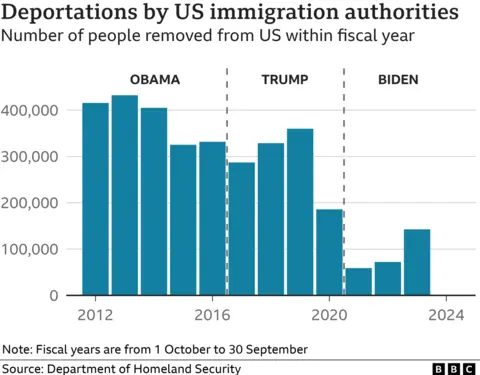Associated Press
Abandoned by his colleagues after negotiating a border compromise, GOP senator faces backlash alone
Mary Clare Jalonick and Stephen Groves – February 7, 2024


WASHINGTON (AP) — Just before the Senate voted Wednesday to kill the border deal he spent the last four months negotiating, Oklahoma Sen. James Lankford climbed a set of marble stairs outside the chamber and joined his wife in the visitors’ gallery.
As the Republican quietly watched from a floor above, briefly the outsider after defending his legislation in a last Senate floor speech, fellow negotiator Kyrsten Sinema of Arizona was down on the floor excoriating the Republicans who had abandoned Lankford, one by one, after insisting on a border deal and asking him to negotiate a compromise on one of the country’s most intractable issues.
“Less than 24 hours after we released the bill, my Republican colleagues changed their minds,” said Sinema, a former Democrat turned Independent. “Turns out they want all talk and no action. It turns out border security is not a risk to our national security. It’s just a talking point for the election.”
Walking out of the gallery with his wife close by his side, Lankford was asked by a waiting reporter if he felt betrayed by his party. He sighed, deeply, and waited a few beats.
“I’m disappointed we didn’t get it done,” Lankford said, diplomatically. “I don’t know if I feel betrayed, because the issue is still there. It’s not solved.”
He then walked back down the stairs with his wife and Sinema, who had come up to greet them after her speech, and walked into the chamber to watch the bill’s defeat.
In the end, all but four Republicans voted against moving forward on the legislation — including Republican Leader Mitch McConnell, who had delegated Lankford to negotiate the bill combining Ukraine aid and border security and had been closely involved in the negotiations.
A former youth minister in the Baptist church, Lankford, 55, is known as one of the most sincere and well-liked members of the Senate. He’s a conservative who rarely votes against his party, has long championed stricter measures at the border and has been supportive of former President Donald Trump. So his colleagues’ swift and outright rejection of the deal he has spent weeks and months negotiating — and their willingness to completely abandon Lankford in the process, after many of them indicated they were supportive of the direction of the talks — is all the more remarkable.
“They reacted to it like it was a poison,” said Democratic Sen. Chris Murphy of Connecticut, the third negotiator with Lankford and Sinema, of Senate Republicans who had previously signaled they were supportive. “I think it’s unforgiveable what they did to James.”
“They really threw the man overboard,” President Joe Biden said of Lankford at a fundraiser Wednesday evening.
While some Republicans were always going to vote against the compromise, arguing that no policy is better than what they saw as weak policy, others made clear they were encouraged by the talks as Lankford briefed them on the emerging details. But his colleagues’ eventual, quick rejection of the bill highlights the deep divides in the GOP as Trump, the party’s front-runner for the 2024 presidential nomination, has made immigration a top issue. Some senators who had previously been open to a deal became more skeptical after Trump made his opposition clear.
It is also a sign of dysfunction and paralysis in the Senate as its traditionally bipartisan image fades in favor of more partisan, House-like battles.
When he took on the job negotiating a border compromise, Lankford laughed that “he drew the short straw.” Sen. Roger Marshall, R-Kan., joked later that if Lankford can’t get a deal done: “Moses couldn’t get a deal done. He’s one of the most kindest, compassionate people I’ve met in my lifetime.”
His fellow negotiators described him as an earnest, smart legislator who was willing to spend long hours digging into the intricacies of immigration law — and spent weeks away from his family in the process. Murphy said senators often negotiate the broad policies and let staff do the “dirty work” of putting the ideas into legislative text.
“James does both,” Murphy said. “It’s a sign of how sincere he is and how in the weeds he is on policy. But it probably means he’s maybe a little less attuned to the politics.”
The Oklahoma Republican has spent the last three days desperately trying to explain the bill after many of his colleagues put out statements opposing it without even reading the full text. Some Republicans put out misleading statements about what it would do, claiming it was designed to let more people into the country. Trump, who has strongly opposed the bill and said he doesn’t want to give Democrats a win on the issue, gleefully bragged that he helped kill it.
“I think this is a very bad bill for his career, and especially in Oklahoma,” Trump said of Lankford on a radio show earlier this week.
The bipartisan compromise would overhaul the asylum system at the border with faster and tougher enforcement, as well as give presidents new powers to immediately expel migrants if authorities become overwhelmed with the number of people applying for asylum, among other measures to reduce the record numbers of migrants crossing the border. It would also send billions to Ukraine, Israel and allies in the Asia-Pacific.
Lankford’s work on the issue could have lasting political consequences. A group of about 100 people within the Oklahoma GOP put out a statement condemning him for crafting the bill even before it had been released. And in his Senate floor speech Wednesday, Lankford spoke of an unidentified “popular commentator” who told him that if he tries to move a bill to solve the border crisis, “I will do whatever I can to destroy you, because I do not want you to solve this during the presidential election.”
Even more stunning was how quickly his Senate colleagues turned against it.
As the bill was released late Sunday night, Lankford was on an airplane flying to Washington. By the time he landed, an onslaught of criticism from conservatives was already underway. He was on a call with reporters, trying to explain the details of the bill, when House Speaker Mike Johnson posted on X that the bill would be “ dead on arrival ” in his chamber.
Lankford’s frustration was palpable as he responded, listing off how the bill would accomplish several conservative goals like building more border wall, hiring more Border Patrol agents, expanding detention capacity and speeding deportations.
“We’ve got to be able to find a way to stop the chaos at the border,” Lankford said.
Almost no Republicans endorsed it, save McConnell. And by Monday night, seeing the writing on the wall, McConnell told the conference it was OK to vote against it.
“I feel like the guy standing in the middle of a field in a thunderstorm holding up the metal stick,” Lankford told reporters shortly ahead of the bill release. “This is a really intense thing. It’s been divisive.”
Associated Press writers Seung Min Kim, Will Weissert, Jill Colvin and Lisa Mascaro contributed to this report.


 Getty Images
Getty Images









